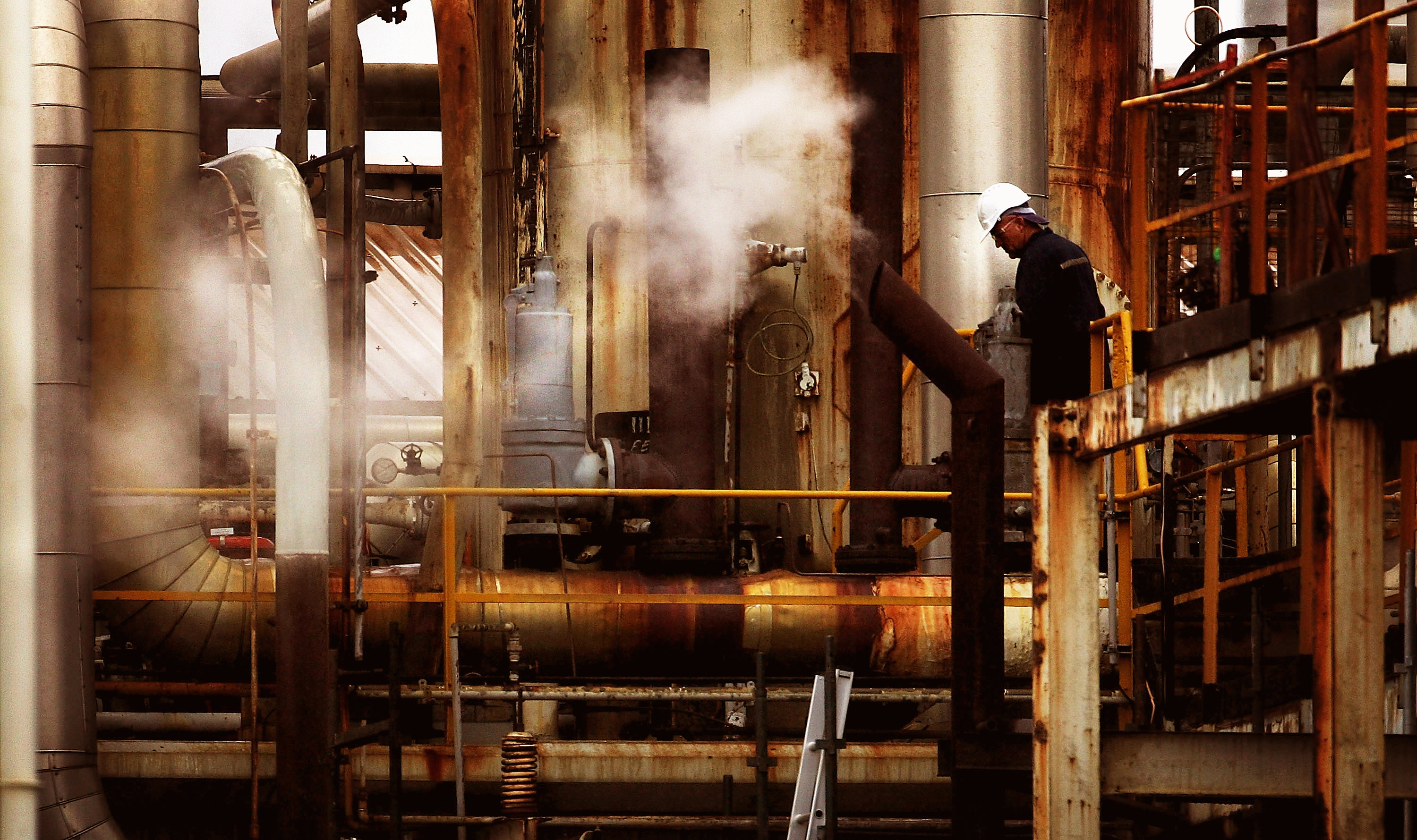Why the oil industry is doomed
The ongoing plunge in oil prices shows the industry's long-term weaknesses


A free daily email with the biggest news stories of the day – and the best features from TheWeek.com
You are now subscribed
Your newsletter sign-up was successful
Canada's oil sands are having a tough go of it.
Also known as tar sands, they're particularly difficult to extract because they're mixed up with sandstone, creating an unusually viscous and dirty form of crude oil. But technological breakthroughs like horizontal drilling and steam injection have rendered them accessible, and what oil sands can't be acquired that way are dug up through massive strip-mining operations.
So there's been a boom in the remote regions of the Canadian province of Alberta. Oil sands production there grew 30 percent in the last five years — part of the general boom in North American fossil fuels.
The Week
Escape your echo chamber. Get the facts behind the news, plus analysis from multiple perspectives.

Sign up for The Week's Free Newsletters
From our morning news briefing to a weekly Good News Newsletter, get the best of The Week delivered directly to your inbox.
From our morning news briefing to a weekly Good News Newsletter, get the best of The Week delivered directly to your inbox.
Then the bottom dropped out of the oil market, and prices plunged starting in June of last year.
Oil prices of $90 or $100 a barrel have been cut by over half — a six-year low for the overall market. On Wednesday, The Wall Street Journal reported that, thanks to the plunge, plus complicating factors, the price of the Canadian oil sands specifically has fallen to a remarkable $24 a barrel.
Projections indicate that the Alberta producers need an overall oil market price of $44 to $50 just to break even over the long term, and around $80 a barrel to justify starting up new projects. Needless to say, all new developments have been suspended, and ongoing projects are "bleeding cash" on every barrel they sell.
Now, the oil industry has always been a creature defined by boom and bust cycles. The current bust will probably end. But the oil industry is also characterized by certain hard structural limits: There's only so much oil under the Earth's surface. Long before we've used it all up we'll be forced to make do with the extremely hard-to-reach stuff, and that may go sooner than we realize, too. Geological studies of the current oil and natural gas booms suggest the economically viable stuff in those reserves will tap out in a decade or two.
A free daily email with the biggest news stories of the day – and the best features from TheWeek.com
At the same time, global demand for oil is only going to keep growing as the human population increases, and more of it enters the global middle class. In short, sooner or later, constricting supply is going to run headlong into swelling demand, permanently rendering oil an economically unviable form of energy.
This makes the Canadian oil sands the proverbial canary in the coal mine. (Or oil well, as it were.)
Like any good, the price of oil is always negotiable, defined by who's winning the eternal shoving match between supply and demand. The current price plunge happened because U.S. oil production roughly doubled (thanks to similar technological advancements) while Canadian and Iraqi production took off as well. Meanwhile, the Organization of the Petroleum Exporting Countries, better known as OPEC, refused to cut back exports. That flooded the market with supply, while the global economic downturn after the Great Recession, and China's recent currency devaluation, shrank demand.
But these are (probably) temporary fluctuations. Even now, the price of oil is relatively high by historical standards, and it's been on an upward trajectory since the late 1990s.
[[{"type":"media","view_mode":"media_large","fid":"126751","attributes":{"alt":"","class":"media-image","height":"309","style":"display: block; margin-left: auto; margin-right: auto;","typeof":"foaf:Image","width":"600"}}]]
(Graph courtesy of the Energy Information Agency)
China and the global economy will eventually recover. Moreover, the price fall-off is already driving the oil industry to cut back investments in long-term production. Half the rigs in the U.S. have shut down, 100,000 oil workers have lost their jobs, and manufacturing of the heavy machinery used by the industry has been curtailed as well. On Wednesday, a federal auction for drilling rights in the Gulf of Mexico attracted fewer bids from oil companies than at any time since 1986.
Obviously, oil production — especially offshore production started from scratch with the purchase of a lease — is not the kind of thing one just switches to the "on" position. When the oil price returns to normal, producers will have an ugly time ramping supply back up to keep even, driving the price even higher.
At that point, alternative forms of energy — not just natural gas, but wind and solar and other renewables — will pour into the breach. In fact, they already are. Wind in particular has effectively pulled even with natural gas, and ahead of coal, and solar isn't far behind. Oil doesn't compete directly on the power grid, but the basic concept is the same: This boom-and-bust cycle pushes along the process of adapting our energy infrastructure — be it transportation or the grid — to treat these alternative sources of energy as the new normal.
This is where the Canadian oil sands enter as the proverbial canary. Their production sits at the frontier of human technological ability. The same goes for offshore drilling, which can resemble a moon landing in the technological prowess brought to bear. Again, all prices in the economy are always negotiable. But the inescapable reality is that these forms of production involve far more resources, technology, and human activity and skill than previous conventional forms of oil production. That doesn't put a hard price on it, but it does create a structural floor for how low that price can go. So whenever there's a supply glut, the production on the technical frontier — like offshore drilling and the Canadian oil sands — are the first to drop off the twig.
But as we tap out the conventional resources and the supply-versus-demand noose keeps tightening, the technologically advanced sources will be all we have left. They're the most unstable forms of oil production, but they're also destined to become the only viable ones. Which is how oil will eventually get squeezed out of the global economy as a widely used energy source.
You'll notice the phrase "climate change" hasn't come up once here. Yet even without it, the future is still eventually going to be dominated by renewable energy. There's no physical limit on sunlight or wind or wave power and such. (Well, actually, there is. But it's about five billion years.) Unfortunately, what we're talking about here is a market evolution based on the quest for the cheapest and most abundant energy. That's what the current price signals are telling it to pursue. Because those price signals don't factor in the costs of climate change, the timeline of that evolution doesn't factor it in either.
So yes. We're going to keep having these booms and busts. They're going to get more frequent. And over the long term, the price of oil will keep rising until we've all gone green, whether we like it or not. But the chances that this will happen fast enough to avert climate cataclysm are basically nil.
Jeff Spross was the economics and business correspondent at TheWeek.com. He was previously a reporter at ThinkProgress.
-
 The Week Unwrapped: Do the Freemasons have too much sway in the police force?
The Week Unwrapped: Do the Freemasons have too much sway in the police force?Podcast Plus, what does the growing popularity of prediction markets mean for the future? And why are UK film and TV workers struggling?
-
 Properties of the week: pretty thatched cottages
Properties of the week: pretty thatched cottagesThe Week Recommends Featuring homes in West Sussex, Dorset and Suffolk
-
 The week’s best photos
The week’s best photosIn Pictures An explosive meal, a carnival of joy, and more
-
 Late night hosts joke about Trump's forced exodus from Facebook to blog
Late night hosts joke about Trump's forced exodus from Facebook to blogSpeed Read
-
 Fox News admits Biden doesn't actually want to cancel meat. Late night hosts pounce anyway.
Fox News admits Biden doesn't actually want to cancel meat. Late night hosts pounce anyway.Speed Read
-
 Manhattan D.A. will stop prosecuting sex workers, not their clients, pimps, or sex traffickers
Manhattan D.A. will stop prosecuting sex workers, not their clients, pimps, or sex traffickersSpeed Read
-
 John Oliver explains personal bankruptcy, how credit card lobbyists and lawyers make it much worse
John Oliver explains personal bankruptcy, how credit card lobbyists and lawyers make it much worseSpeed Read
-
 John Oliver explores problems with U.S. nursing homes and long-term care, suggests you pay attention
John Oliver explores problems with U.S. nursing homes and long-term care, suggests you pay attentionSpeed Read
-
 John Oliver tries to explain whether you should worry about the enormous U.S. national debt
John Oliver tries to explain whether you should worry about the enormous U.S. national debtSpeed Read
-
 Late night hosts laugh at the giant ship blocking the Suez Canal, chide Fox News for fake Kamala Harris scandal
Late night hosts laugh at the giant ship blocking the Suez Canal, chide Fox News for fake Kamala Harris scandalSpeed Read
-
 Utah governor signs bill requiring porn blocking on all new smartphones and tablets
Utah governor signs bill requiring porn blocking on all new smartphones and tabletsSpeed Read
